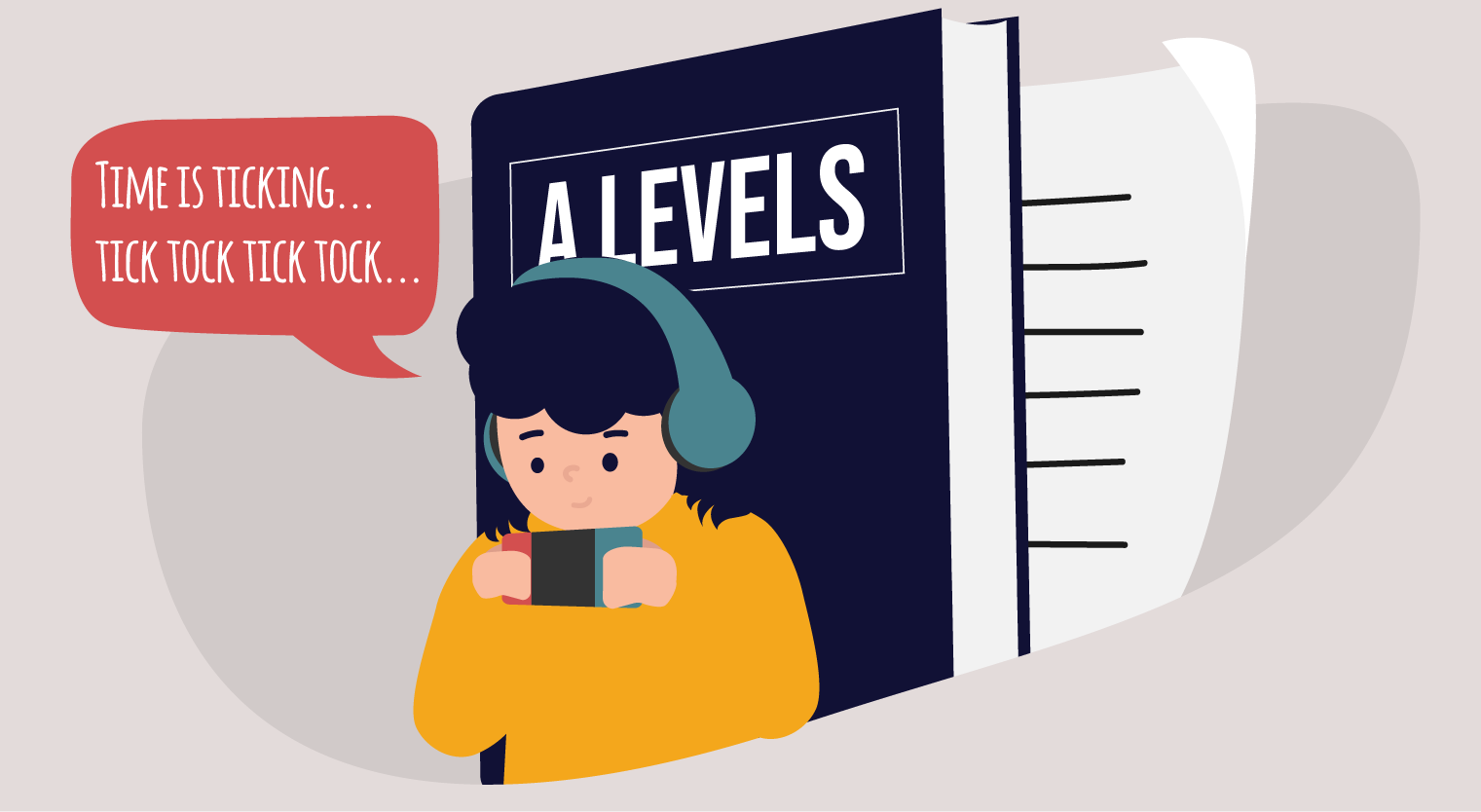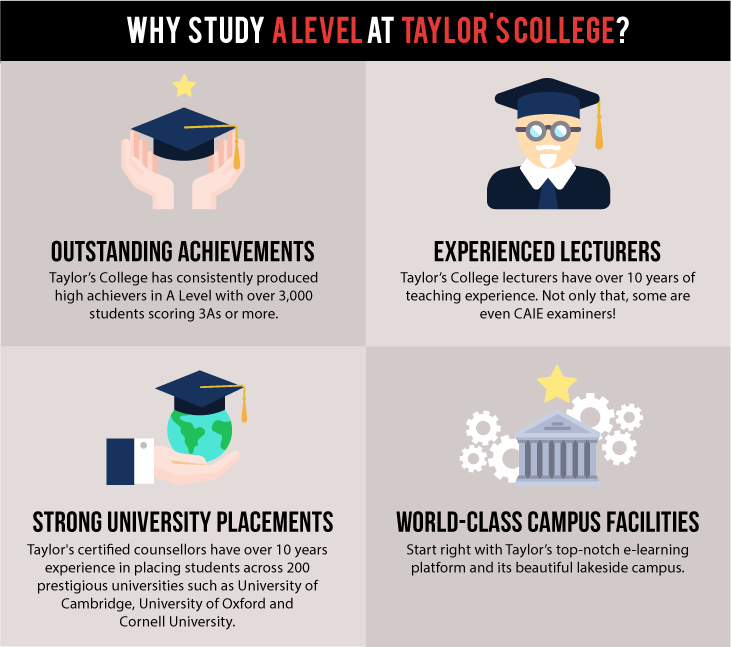How A Level Will Challenge You to Be Incredible
How hard is studying for A Levels? Read here for a realistic picture of this notorious but highly sought-after programme.
Updated 01 May 2022


If you’re scouting for a pre-university programme, you would have definitely heard of the prestigious Cambridge A Level — and of course, its notoriety.
Deemed as the ‘gold standard’ of pre-university qualifications, the programme is known for its immense level of difficulty. Yet, year after year, thousands of students from over 130 countries flock to battle the exams, and only the tough survive.
So why would someone put themselves through such a challenge? Believe it or not, adversity is the fuel of greatness. Here's how A Level can help you achieve your biggest and boldest dreams.
#1. The subject material is really hard

Due to its in-depth syllabus, the Cambridge A Level will have you dive oceans deep for each of your chosen subject, demanding you to put in twice the effort compared to SPM. Moreover, the subjects also get increasingly difficult as you progress each semester, so you'll need a strong foundation in the earlier chapters.
But… all your hard work will pay off eventually
All that toiling will come to fruition as you’ll be more than prepared for university. As the study material from A Level is very comprehensive and provides you with a strong foundation, many students feel that A Level has eased them into their first year of university, which is a plus point for you! As they say, no pain, no gain.
PRO TIP
At Taylor's College, you won't have to go through this strenuous process alone! You'll be guided by a faculty of qualified and experienced teachers who are there to ensure you get the best learning experience throughout your A Level. From examination tips to frequent consultation, rest assured you'll have all the confidence you need to stride your way into the examination halls!
#2. The 100% exams system is stressful

You probably know that A Level consists of 2 major parts — the Advanced Subsidiary Level (AS Level) that makes up the first half of the syllabus and the A2 Level which constitutes the second half of the programme. Your final grades will be based on the two sole exams that you'll take at AS and A2 Level. In other words, it's bad news if you do poorly in the exams.
But… this means plenty of time to master your study material
Yes, exams are the bane of existence for many. And while you may feel like you're putting all your eggs in one basket, the A Level programme is usually 18 – 24 months long. This means you'll have ample time to hit the books and prepare for the exams as long as you’re consistent in your studies. For those who take a while to grasp their study material, A Level is the perfect choice as you won't be thrown coursework and assignments from the get-go.
DID YOU KNOW
Taylor’s College has consistently produced high achievers in A Level with over 3,000 students scoring 3As or more since 2012. Click here to learn more.
#3. You can’t afford to slack

Speak to anyone who has taken A Level and they'll tell you that there's no time to slack. While there's no assignments to submit or group projects to work on, be prepared for many gruelling and intense hours of lectures due to the sheer volume of material that you'll have to cover. After all, the entire A Level syllabus is easily three times of that as SPM. Studying for A Level means you have to bring your A game to college — every day.
But... this will improve your time management skills
We're not going to lie, A Level takes effort and lots of hard work, but it is by no means Mount Everest. Top A Level students have cited consistent revision as one of the secrets to success. So get organised, plan your revision ahead and you'll have no reason to panic. Once this is all done and dusted, you'll find that you're a whizz at managing time and staying focussed — skills that are useful for university and beyond!

#4. You’ll be racking your brains — a lot

If you think you can survive A Levels by relying on the power of memory, think again. Studying for A Levels is the exact opposite of studying for your SPM where you may have depended on memorising and regurgitating to score good grades. A Level can be a tough nut to crack as it is designed to test your ability to think critically. Hence, you need to master your subjects and apply the concepts that you've learnt in your exams — or you’ll end up with less than desirable grades.
But... this will sharpen your critical thinking
Even if you don't end up pursuing a degree that's directly related to your A Level subjects, don't think that the studying is all for nought. Applying concepts to problems are great exercises for your brain and will help to sharpen your critical thinking and logical reasoning, which are crucial as you embark on your degree. You’ll come out the other side of the tunnel stronger and thankful for the tough training A Level has put you through!
DID YOU KNOW
Taylor’s College has placed countless graduates in top universities around the globe, including University of Cambridge and University of Oxford. Learn more here.
Although studying for A Level is no easy feat, those who persevere will find the hard work and experience extremely rewarding. Believe it or not, there's something immensely satisfying about coming out the other side victorious. So, go forth and take up the challenge!
Convinced that A Level will push you to be incredible?


Thank you for your enquiry
Here's what will happen next.
You’ll receive a WhatsApp confirmation from us regarding your enquiry.
Our advisors will be in touch to give you all the information you need.
Did you know all EduAdvisor students can enjoy some of the following waivers / discounts?
- Registration Waivers, Discounts and Rebates: EduAdvisor students often enjoy additional waivers, discounts and rebates during registration due to our close relationship with universities.
- EduAdvisor Registration Reward: Any student that registers through EduAdvisor (or makes an appointment to visit the university through EduAdvisor) is eligible for an extra EduAdvisor Registration Reward of RM300. T&C applies.
Start your application today via our online application form: https://eduadvisor.my/apply

Thank you for your enquiry
Here's what will happen next.
You’ll receive a WhatsApp confirmation from us regarding your enquiry.
Our advisors will be in touch to give you all the information you need.
Did you know all EduAdvisor students can enjoy some of the following waivers / discounts?
- Registration Fee Waiver: A 100% registration fee waiver is available for all EduAdvisor students using this waiver code — AGE24
- EduAdvisor Registration Reward: Any student that registers through EduAdvisor (or makes an appointment to visit the university through EduAdvisor) is eligible for an extra EduAdvisor Registration Reward of RM300. T&C applies.
Head over to: https://www.rumc.edu.my/apply-now/
Remember to use the following waiver code to be eligible for a 100% waiver on the application fee and our EduAdvisor Registration Reward: AGE24

Thank you for your enquiry
Here's what will happen next.
You’ll receive a WhatsApp confirmation from us regarding your enquiry.
Our advisors will be in touch to give you all the information you need.
Did you know all EduAdvisor students can enjoy some of the following waivers / discounts?
- EduAdvisor Registration Reward: Any student that registers through EduAdvisor (or makes an appointment to visit the university through EduAdvisor) is eligible for an extra EduAdvisor Registration Reward of RM300. T&C applies.
Head over to: https://admission.unikl.edu.my/online/frmHome.php
Remember to use the following public agent code to be eligible for our EduAdvisor Registration Reward: PA0001

Thank you for your enquiry
Here's what will happen next.
You’ll receive a WhatsApp confirmation from us regarding your enquiry.
Our advisors will be in touch to give you all the information you need.
Did you know all EduAdvisor students can enjoy some of the following waivers / discounts?
- EduAdvisor Registration Reward: Any student that registers through EduAdvisor (or makes an appointment to visit the university through EduAdvisor) is eligible for an extra EduAdvisor Registration Reward of RM300. T&C applies.
Head over to: https://application.mmu.edu.my/
Select “Agent ID”, fill in the EduAdvisor agent code: AG0000409 and select Distinctive Education Advisor to be eligible for our EduAdvisor Registration Reward.

Thank you for your enquiry
Here's what will happen next.
You’ll receive a WhatsApp confirmation from us regarding your enquiry.
Our advisors will be in touch to give you all the information you need.
Did you know all EduAdvisor students can enjoy some of the following waivers / discounts?
- EduAdvisor Registration Reward: Any student that registers through EduAdvisor (or makes an appointment to visit the university through EduAdvisor) is eligible for an extra EduAdvisor Registration Reward of RM300. T&C applies.
Head over to: https://oculus.uts.edu.my/apply/signup.php
Remember to use the following agent ID to be eligible for our EduAdvisor Registration Reward: DEA

Thank you for your enquiry
Here's what will happen next.
You’ll receive a WhatsApp confirmation from us regarding your enquiry.
Our advisors will be in touch to give you all the information you need.
Did you know all EduAdvisor students can enjoy some of the following waivers / discounts?
- Registration Fee Waiver: A 50% registration fee waiver is available for EduAdvisor students during selected UCSI events.
- EduAdvisor Registration Reward: Any student that registers through EduAdvisor (or makes an appointment to visit the university through EduAdvisor) is eligible for an extra EduAdvisor Registration Reward of RM300. T&C applies.
Head over to UCSI’s website here.
Remember to use the following agent code to be eligible for our EduAdvisor Registration Reward: 779700

Thank you for your enquiry
Here's what will happen next.
You’ll receive a WhatsApp confirmation from us regarding your enquiry.
Our advisors will be in touch to give you all the information you need.
Did you know all EduAdvisor students can enjoy some of the following waivers / discounts?
- Registration Fee Waiver: A 50% registration fee waiver is available for EduAdvisor students during selected UCSI events.
- EduAdvisor Registration Reward: Any student that registers through EduAdvisor (or makes an appointment to visit the university through EduAdvisor) is eligible for an extra EduAdvisor Registration Reward of RM300. T&C applies.
Head over to UCSI’s website here.
Remember to use the following agent code to be eligible for our EduAdvisor Registration Reward: 100023

Thank you for your enquiry
Here's what will happen next.
You’ll receive a WhatsApp confirmation from us regarding your enquiry.
Our advisors will be in touch to give you all the information you need.
Did you know all EduAdvisor students can enjoy some of the following waivers / discounts?
- Tuition Fee Rebate: A RM1,500 tuition fee rebate is available for EduAdvisor students during selected NUMed events.
- EduAdvisor Registration Reward: Any student that registers through EduAdvisor (or makes an appointment to visit the university through EduAdvisor) is eligible for an extra EduAdvisor Registration Reward of RM300. T&C applies.
Head over to: https://application.newcastle.edu.my/registration?ref=1652487az1ydp0i

Thank you for your enquiry
Here's what will happen next.
You’ll receive a WhatsApp confirmation from us regarding your enquiry.
Our advisors will be in touch to give you all the information you need.
Did you know all EduAdvisor students can enjoy some of the following waivers / discounts?
- EduAdvisor Registration Reward: Any student that registers through EduAdvisor (or makes an appointment to visit the university through EduAdvisor) is eligible for an extra EduAdvisor Registration Reward of RM300. T&C applies.
Head over to: https://intake.utmspace.edu.my/refer/63c50d45156c8

Thank you for your enquiry
Here's what will happen next.
You’ll receive a WhatsApp confirmation from us regarding your enquiry.
Our advisors will be in touch to give you all the information you need.
Did you know all EduAdvisor students can enjoy some of the following waivers / discounts?
- Early Bird Waiver: A waiver of RM1,000 is available for all EduAdvisor students enrolling in this programme. T&C applies.
- Edu Assist: A tuition fee waiver of up to 35% is available for students that are from low income family. T&C applies.
- EduAdvisor Registration Reward: Any student that registers through EduAdvisor (or makes an appointment to visit the university through EduAdvisor) is eligible for an extra EduAdvisor Registration Reward of RM300. T&C applies.
Start your application today via our online application form: https://eduadvisor.my/apply

Thank you for your enquiry
Here's what will happen next.
You’ll receive a WhatsApp confirmation from us regarding your enquiry.
Our advisors will be in touch to give you all the information you need.
Did you know all EduAdvisor students can enjoy some of the following waivers / discounts?
- RM500 Rebate: A rebate of RM500 is available for all EduAdvisor students enrolling in this programme.
- EduAdvisor Registration Reward: Any student that registers through EduAdvisor (or makes an appointment to visit the university through EduAdvisor) is eligible for an extra EduAdvisor Registration Reward of RM300. T&C applies.
Start your application today via our online application form: https://eduadvisor.my/apply

Thank you for your enquiry
Here's what will happen next.
You’ll receive a WhatsApp confirmation from us regarding your enquiry.
Our advisors will be in touch to give you all the information you need.
Did you know all EduAdvisor students can enjoy some of the following waivers / discounts?
- Registration Bursary: A further discount of RM1,000 is available for eligible students enrolling in this programme.
Start your application today via our online application form: https://eduadvisor.my/apply

Thank you for your enquiry
Here's what will happen next.
You’ll receive a WhatsApp confirmation from us regarding your enquiry.
Our advisors will be in touch to give you all the information you need.
Did you know all EduAdvisor students can enjoy some of the following waivers / discounts?
- Open Day Waiver: A further waiver of RM450 to RM800 is available for eligible students enrolling in this programme during IMU's Open Day events.
- EduAdvisor Registration Reward: Any student that registers through EduAdvisor (or makes an appointment to visit the university through EduAdvisor) is eligible for an extra EduAdvisor Registration Reward of RM300. T&C applies.
Start your application today via our online application form: https://eduadvisor.my/apply

Thank you for your enquiry
Here's what will happen next.
You’ll receive a WhatsApp confirmation from us regarding your enquiry.
Our advisors will be in touch to give you all the information you need.
Did you know all EduAdvisor students can enjoy some of the following waivers / discounts?
- Application Fee Waiver: A RM100 application fee waiver code is available for EduAdvisor students during selected Monash events.
- EduAdvisor Registration Reward: Any student that registers through EduAdvisor (or makes an appointment to visit the university through EduAdvisor) is eligible for an extra EduAdvisor Registration Reward of RM300. T&C applies.
Start your application today via our online application form: https://eduadvisor.my/apply

Thank you for your enquiry
Here's what will happen next.
You’ll receive a WhatsApp confirmation from us regarding your enquiry.
Our advisors will be in touch to give you all the information you need.
Did you know all EduAdvisor students can enjoy some of the following waivers / discounts?
- EduAdvisor Registration Reward: Any student that registers through EduAdvisor (or makes an appointment to visit the university through EduAdvisor) is eligible for an extra EduAdvisor Registration Reward of RM300. T&C applies.
Start your application today via our online application form: https://eduadvisor.my/apply

Thank you for your enquiry
Here's what will happen next.
You’ll receive a WhatsApp confirmation from us regarding your enquiry.
Our advisors will be in touch to give you all the information you need.
Did you know all EduAdvisor students can enjoy some of the following waivers / discounts?
- Registration Fee Rebate: A registration fee rebate of up to RM1,000 is available for EduAdvisor students enrolling in this programme.
- Early Bird Waiver: An early bird waiver of RM1,500 is available for EduAdvisor students enrolling in this programme for the July 2024 intake.
- EduAdvisor Registration Reward: Any student that registers through EduAdvisor (or makes an appointment to visit the university through EduAdvisor) is eligible for an extra EduAdvisor Registration Reward of RM300. T&C applies.
Start your application today via our online application form: https://eduadvisor.my/apply

Thank you for your enquiry
Here's what will happen next.
You’ll receive a WhatsApp confirmation from us regarding your enquiry.
Our advisors will be in touch to give you all the information you need.
Did you know all EduAdvisor students can enjoy some of the following waivers / discounts?
- Early Bird / Event Day Waiver: A fee waiver of RM500 is available for all EduAdvisor students enrolling in this programme. T&C applies.
- EduAdvisor Registration Reward: Any student that registers through EduAdvisor (or makes an appointment to visit the university through EduAdvisor) is eligible for an extra EduAdvisor Registration Reward of RM300. T&C applies.
Start your application today via our online application form: https://eduadvisor.my/apply

Thank you for your enquiry
Here's what will happen next.
You’ll receive a WhatsApp confirmation from us regarding your enquiry.
Our advisors will be in touch to give you all the information you need.
Did you know all EduAdvisor students can enjoy some of the following waivers / discounts?
- Open Day Waiver: A application fee waiver of up to RM500 is available for all EduAdvisor students enrolling in this programme during MAHSA's Open Days.
- EduAdvisor Registration Reward: Any student that registers through EduAdvisor (or makes an appointment to visit the university through EduAdvisor) is eligible for an extra EduAdvisor Registration Reward of RM300. T&C applies.
Start your application today via our online application form: https://eduadvisor.my/apply

Thank you for your enquiry
Here's what will happen next.
You’ll receive a WhatsApp confirmation from us regarding your enquiry.
Our advisors will be in touch to give you all the information you need.
Did you know all EduAdvisor students can enjoy some of the following waivers / discounts?
- Registration Fee Waiver: A Registration Fee Waiver of up to RM500 is available for EduAdvisor students.
- Special Tuition Fee Waiver: A further discount of RM1,000 is available for eligible EduAdvisor Students enrolling in this programme.
- EduAdvisor Registration Reward: Any student that registers through EduAdvisor (or makes an appointment to visit the university through EduAdvisor) is eligible for an extra EduAdvisor Registration Reward of RM300. T&C applies.
Start your application today via our online application form: https://eduadvisor.my/apply

Thank you for your enquiry
Here's what will happen next.
You’ll receive a WhatsApp confirmation from us regarding your enquiry.
Our advisors will be in touch to give you all the information you need.
Did you know all EduAdvisor students can enjoy some of the following waivers / discounts?
- Registration Fee Discount: A rebate of RM500 to RM1,000 is available for EduAdvisor students enrolling in this programme.
- EduAdvisor Registration Reward: Any student that registers through EduAdvisor (or makes an appointment to visit the university through EduAdvisor) is eligible for an extra EduAdvisor Registration Reward of RM300. T&C applies.
Start your application today via our online application form: https://eduadvisor.my/apply

Thank you for your enquiry
Here's what will happen next.
You’ll receive a WhatsApp confirmation from us regarding your enquiry.
Our advisors will be in touch to give you all the information you need.
Did you know all EduAdvisor students can enjoy some of the following waivers / discounts?
- Event Waiver: A RM500 admin fee rebate is available for all EduAdvisor students during selected UM-Wales events. T&C applies.
- EduAdvisor Registration Reward: Any student that registers through EduAdvisor (or makes an appointment to visit the university through EduAdvisor) is eligible for an extra EduAdvisor Registration Reward of RM300. T&C applies.
Start your application today via our online application form: https://eduadvisor.my/apply

Thank you for your enquiry
Here's what will happen next.
You’ll receive a WhatsApp confirmation from us regarding your enquiry.
Our advisors will be in touch to give you all the information you need.
Did you know all EduAdvisor students can enjoy some of the following waivers / discounts?
- Registration Waiver: A rebate of RM1,000 to RM2,000 is available for EduAdvisor students enrolling in this programme.
- EduAdvisor Registration Reward: Any student that registers through EduAdvisor (or makes an appointment to visit the university through EduAdvisor) is eligible for an extra EduAdvisor Registration Reward of RM300. T&C applies.
Start your application today via our online application form: https://eduadvisor.my/apply

Thank you for your enquiry
Here's what will happen next.
You’ll receive a WhatsApp confirmation from us regarding your enquiry.
Our advisors will be in touch to give you all the information you need.
Did you know all EduAdvisor students can enjoy some of the following waivers / discounts?
- Application Fee Waiver: A fee waiver of RM150 is available for all EduAdvisor students enrolling in this programme. T&C applies.
- EduAdvisor Registration Reward: Any student that registers through EduAdvisor (or makes an appointment to visit the university through EduAdvisor) is eligible for an extra EduAdvisor Registration Reward of RM300. T&C applies.
Start your application today via our online application form: https://eduadvisor.my/apply

Thank you for your enquiry
Here's what will happen next.
You’ll receive a WhatsApp confirmation from us regarding your enquiry.
Our advisors will be in touch to give you all the information you need.
Did you know all EduAdvisor students can enjoy some of the following waivers / discounts?
- Open Day Rebate: A RM500 rebate is available for EduAdvisor students during MCKL's events.
- EduAdvisor Registration Reward: Any student that registers through EduAdvisor (or makes an appointment to visit the university through EduAdvisor) is eligible for an extra EduAdvisor Registration Reward of RM300. T&C applies.
Start your application today via our online application form: https://eduadvisor.my/apply
Thank you for your enquiry
Here's what will happen next.
You’ll receive a WhatsApp confirmation from us regarding your enquiry.
Our advisors will be in touch to give you all the information you need.
Did you know all EduAdvisor students can enjoy some of the following waivers / discounts?
- Open Day Waiver: A application fee waiver of up to RM500 is available for all EduAdvisor students enrolling in this programme during MAHSA's Open Days.
- EduAdvisor Registration Reward: Any student that registers through EduAdvisor (or makes an appointment to visit the university through EduAdvisor) is eligible for an extra EduAdvisor Registration Reward of RM300. T&C applies.
Head over to: https://at.edv.my/apply-mahsa
Thank you for your enquiry
Here's what will happen next.
You’ll receive a WhatsApp confirmation from us regarding your enquiry.
Our advisors will be in touch to give you all the information you need.
Did you know all EduAdvisor students can enjoy some of the following waivers / discounts?
- Registration Waivers, Discounts and Rebates: EduAdvisor students often enjoy additional waivers, discounts and rebates during registration due to our close relationship with universities.
- EduAdvisor Registration Reward: Any student that registers through EduAdvisor (or makes an appointment to visit the university through EduAdvisor) is eligible for an extra EduAdvisor Registration Reward of RM300. T&C applies.
Start your application today via our online application form: https://eduadvisor.my/apply

Generating your application
Hang tight! This will only take 1-2 minutes...
0%

Your application form is ready
We've prepared your university application based on the details provided. Review and sign to complete your university application.

Submitting your application
Hang tight! This will only take 1-2 minutes...
0%

Your application form is submitted

Josephine Serena
Media studies and journalism graduate. Buy me coffee and I'll spill the beans. Also really tall.




